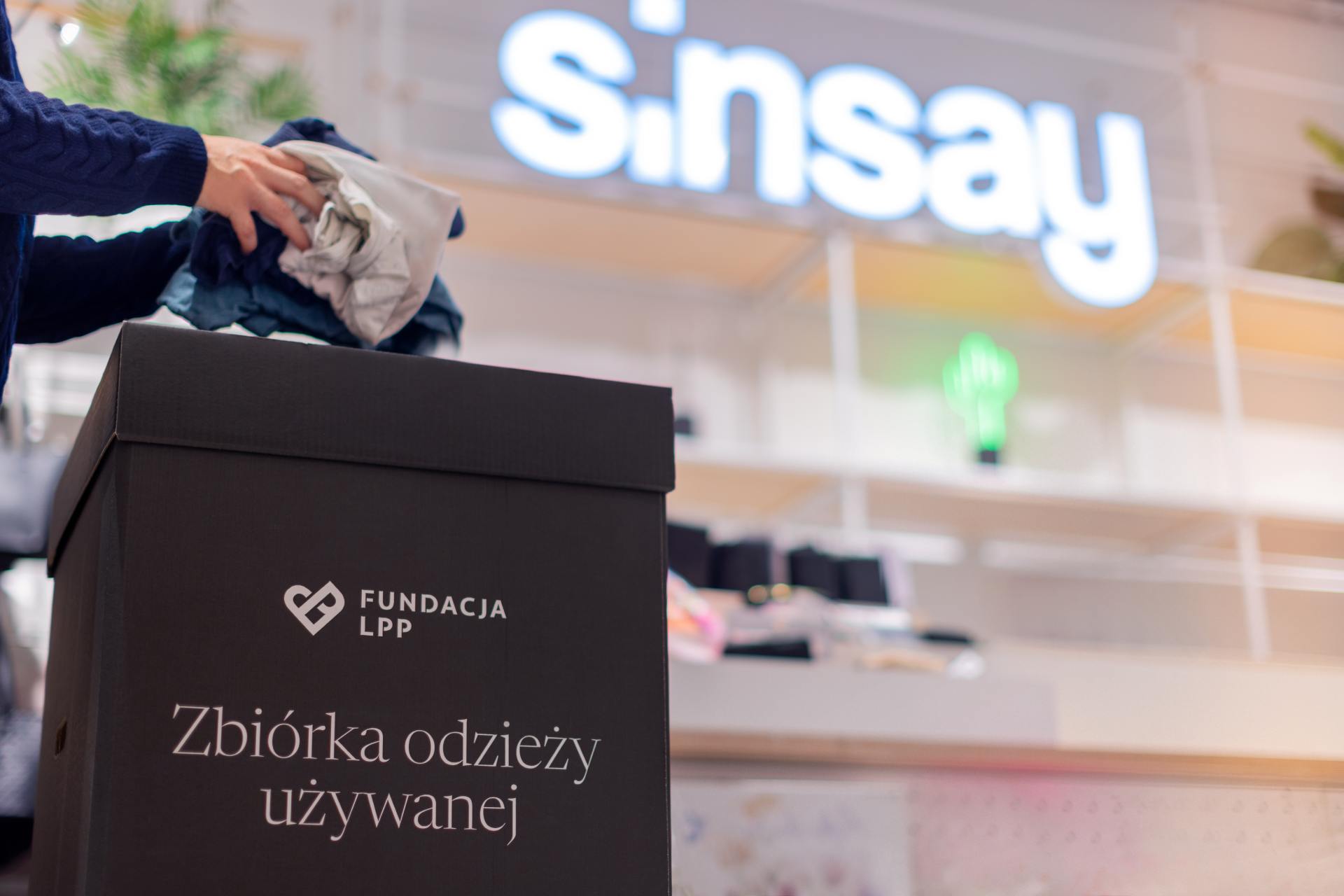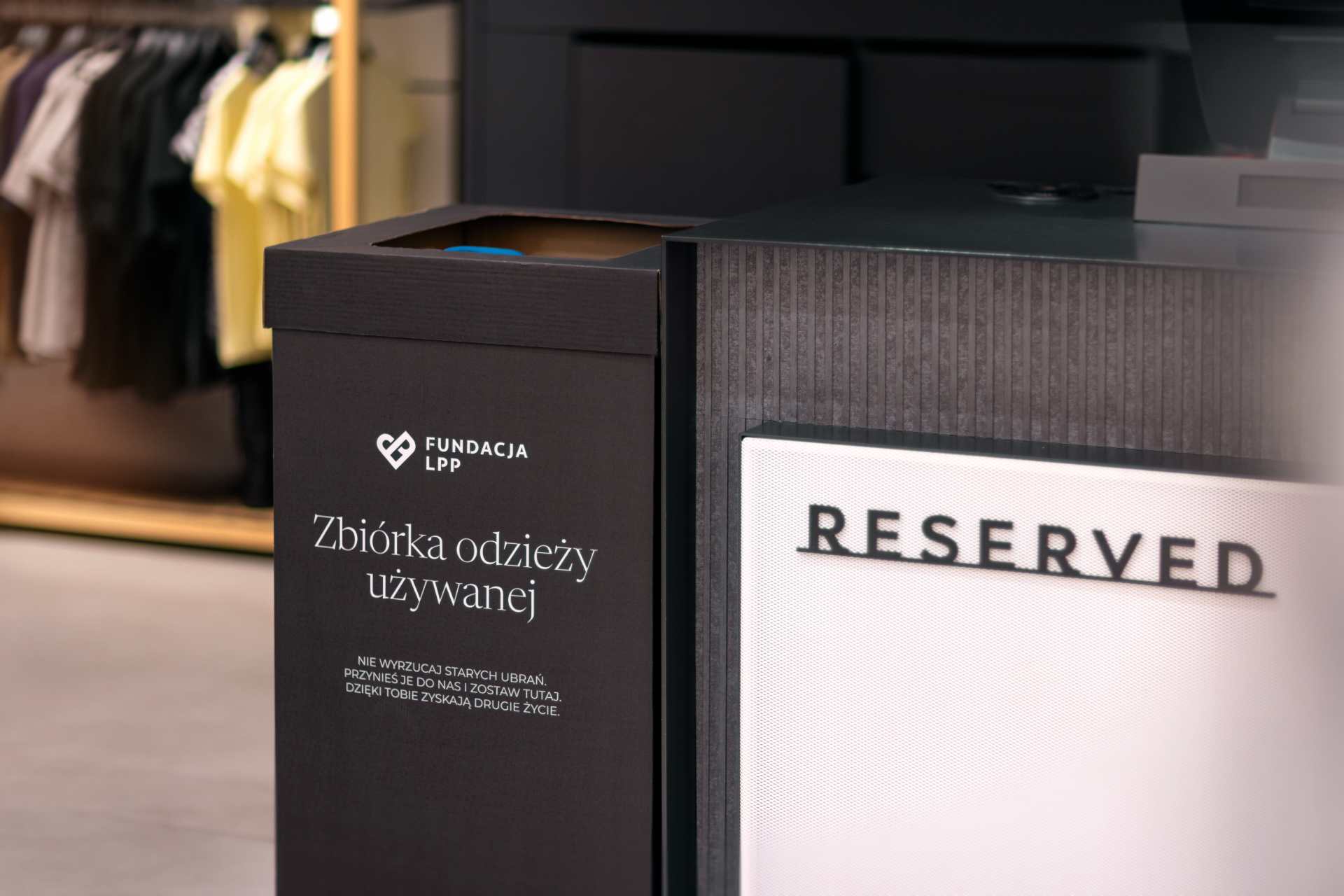Special containers for unwanted clothing in all LPP shops. This Polish manufacturer responds to the new regulations to better meet its customers’ needs

The LPP clothing group has introduced specially labelled containers for unwanted clothing in its shops. This initiative by this Gdańsk-based company is their response to the new regulations on the selective collection of textiles, which took effect in early January of this year. Clothes collected in designated bins are sorted and then either donated to charitable organisations or processed for further use.
Starting on 1 January 2025, the European Union has made it mandatory to introduce separate waste collection systems for textiles, clothing and footwear. The idea behind the regulation is to improve waste sorting, ensuring that textiles, clothing and footwear can be reused or recycled instead of ending up in landfills. Separating textiles, clothing and footwear into a distinct waste category aims to prevent their disposal in mixed waste bins.
LPP shops have been accepting used clothing since 2018. Initially, the initiative was introduced in approximately 20 selected Reserved shops. Within a year, in response to significant customer interest, the company expanded the programme to include the House and Mohito shops. By early 2023, the collection programme had been implemented across all LPP shops in Poland. In 2024, the initiative was extended to several international markets.
The availability of municipal waste selective collection points and containers within cities has proven insufficient. Since the start of its clothing collection initiative, the Gdańsk-based company has made efforts to promote a circular approach to fashion while offering consumers a simple collection system to suit their needs.
– Since February 2025, customers have been able to leave their unwanted clothing in specially designed cardboard collection bins. They are available in all Sinsay, Reserved, House, Cropp and Mohito shops throughout Poland, i.e. more than 1,000 locations in total. As a result, people can now return their clothes for recycling not only in large cities, but also in smaller towns, where there are fewer collection points. The only exceptions are approximately 35 of the smallest shops, each under 300 m2, where we are unable to place containers due to space constraints. However, customers in these locations can still participate in the programme by handing over their clothing to shop staff at the checkout counters – says Ewa Janczukowicz-Cichosz, sustainability expert at LPP.

Clothes collected in LPP shops goes to the Social Integration Centre in Gdynia. There, as part of the “Sortownia” programme, they undergo an initial sorting process, being divided into two main categories: items suitable for reuse and those that do not meet the required quality standards. Clothes in good condition are donated to the St. Brother Albert Aid Society, which distributes them to people in need.
Clothes that do not meet the quality criteria are managed through LPP’s partnership with Wtórpol, being either recycled or used in the production of industrial cleaning cloths and alternative fuels.
– Sorting centres like ours play a key role in the circular economy of textiles by enabling the effective management of unwanted clothing. Every item of clothing has its own value. Even if worn textiles can no longer serve their original purpose, they remain a valuable resource that can be re-used in various ways, significantly extending their lifecycle. This is why we are delighted to start working with LPP – together we can contribute to the responsible management of textiles and give clothes a second life. Such initiatives are crucial in building a more sustainable future – emphasises Monika Lipnicka, an expert in the secondary textile market at Wtórpol.
LPP’s clothing collection programme extends beyond Poland. Since 2024, the initiative has been implemented in foreign markets, such as the Czech Republic, Slovakia and the United Kingdom. In January this year, it was introduced in Lithuania, while in the coming months, the company intends to launch the programme in Bulgaria. In each of these countries, LPP collaborates with local partners who operate according to circular economy principles, implementing innovative solutions.
One such example is advanced upcycling technology, which transforms textile waste into granulate, which is then added to a patented substance to create a unique blend. This material is used to manufacture new products, most commonly household accessories, which are also suitable for reuse.
Through its steadily expanding clothing collection programme in Poland and abroad, LPP actively supports the circular economy and helps its customers to recycle their textiles. Thanks to LPP’s partnership with the St. Brother Albert Aid Society and Wtórpol, an impressive 96% of collected items found a second life in 2024, such as by distributing them to those in need. The scale of this initiative continues to grow, making responsible clothing disposal more accessible to an increasing number of people.
______________________________________________________________________________
LPP is a Polish family company, one of the most rapidly growing in the fashion industry in the Central European region. It has been very successful in designing and selling its collections and accessories in Poland and abroad for the past 30 years. LPP manages 5 fashion brands: Reserved, Cropp, House, Mohito, and Sinsay, with the product ranges now available for sale in shops and online in 41 markets worldwide. The company has more than 2500 shops, with a total area in excess of 2 million m2, distributing products to 3 continents every year. LPP also has an important role in creating jobs for nearly 43,000 people in offices and sales structures in Poland, Europe, Asia, and Africa. The company is listed on the Warsaw Stock Exchange in the WIG20 index and belongs to the prestigious MSCI Poland Index.

